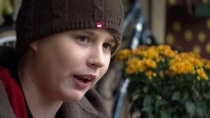The McCormick Family from Wisconsin adopted two children from a Russian orphanage in the 90’s. One of the children they adopted was a nine month-old girl and the other a two and a half year-old boy. Their daughter adapted easily to her new parents, but they felt that something wasn’t quite right with their son from the moment they met him in the orphanage. Unlike his sister who enjoyed being held and was easy-going, their son, Alex, seemed uninterested in his new parents and withdrawn.
They thought the problems they spotted in the orphanage would lessen once they came home. But their son’s behavior became worse. He became easily over-stimulated, was difficult to console and showed no affection for his parents. His medical records, which his parents received from the orphanage some time later, showed that he had been heavily sedated in the orphanage with barbiturates and that he had also been given anti-seizure medication. They surmised that because he had been a high-maintenance baby he had been medicated and neglected.
Alex was diagnosed with ADHD initially but the medication he was given for that made his behavior worse. He was also incorrectly diagnosed with Autism. He was treated by several psychiatrists for behavior problems over the years, but none of them was able to provide a concrete diagnosis or an improvement in his condition.
Finally, therapist Ray Kinney diagnosed him with Reactive Attachment Disorder, a rare and complex psychiatric illness that can affect young children. It is characterized by serious problems in emotional attachments to others where the child purposefully detaches from his primary caregivers. The McCormicks continue to work in family therapy with Ray Kinney who specializes in adopted children.
Their son has also been studied by Dr. Seth Pollak an expert on early childhood development and attachment theory. He has made tremendous strides—he’s in a mainstream school, he is learning to adjust to the needs of his adoptive family and to accept and give affection. He is a bright and engaging boy, but his behavioral problems continue to present huge challenges for his family.






